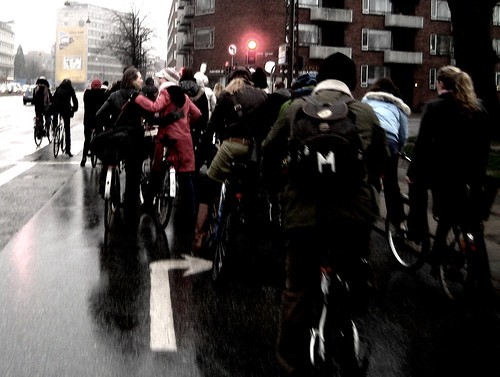
Above: You always meet people you know when commuting by bike. One distinct advantage over automotive pursuits.
The country's second largest party - The Social Democrats - have announced a plan for improving Denmark's status as a leading cycle nation.
"The bike is a multi-dimensional problem solver", says Rasmus Prehn, the Social Democrats bicycle spokesman. [Yes, our political parties actually have an MP who is desginated as bike spokesman/woman]
The party aims to invest 1 billion Danish kroner - [135 million euros / 200 million dollars] - over ten years in our already well-established bike culture.
The party points to several studies, including a Norwegian one that shows that national investment in cycling infrastructure and culture will earn the state three times as much as their intial investment. This profit comes from less money spent on roads and less money spent on health issues - the more the people ride, the less they suffer from "The American Illness" - obesity - and other lifestyle illnesses like diabetes 2 and heart disease.
It's a detailed document they've written but it contains several highlights:
-Aiming to brand Denmark as the world's leading bicycling nation and as the nation in the world that has done the most for advocating bicycling.
- Establishing bike 'motorways'.
In Copenhagen there are roads that have excessive amounts of bikes. Over 20,000 bikes between 06:00 and 24:00. Creating dedicated bike motorways will make it easier and quicker to ride through the city.
- Better parking facilites for bikes in the big cities and for commuters.
- More and better bike lanes/paths.
- Making it free to take bikes on trains and busses.
At the moment there is a fee for taking bikes on trains - 2 dollars in Copenhagen.
- Service stations at busy train and bus stations.
Many people don't ride their bikes because they're not fixed. Establishing service centres wiill give them the chance to have their bikes repaired while they're at work or school.
- Increased safety in traffic.
All very interesting, all very promising. It is, however, a political party so let's see what they actually do with the proposal.
All in all it shows how important the bike is for Denmark and Copenhagen.
Sources: Politiken.dk [in Danish] & Social Democrats [in Danish]